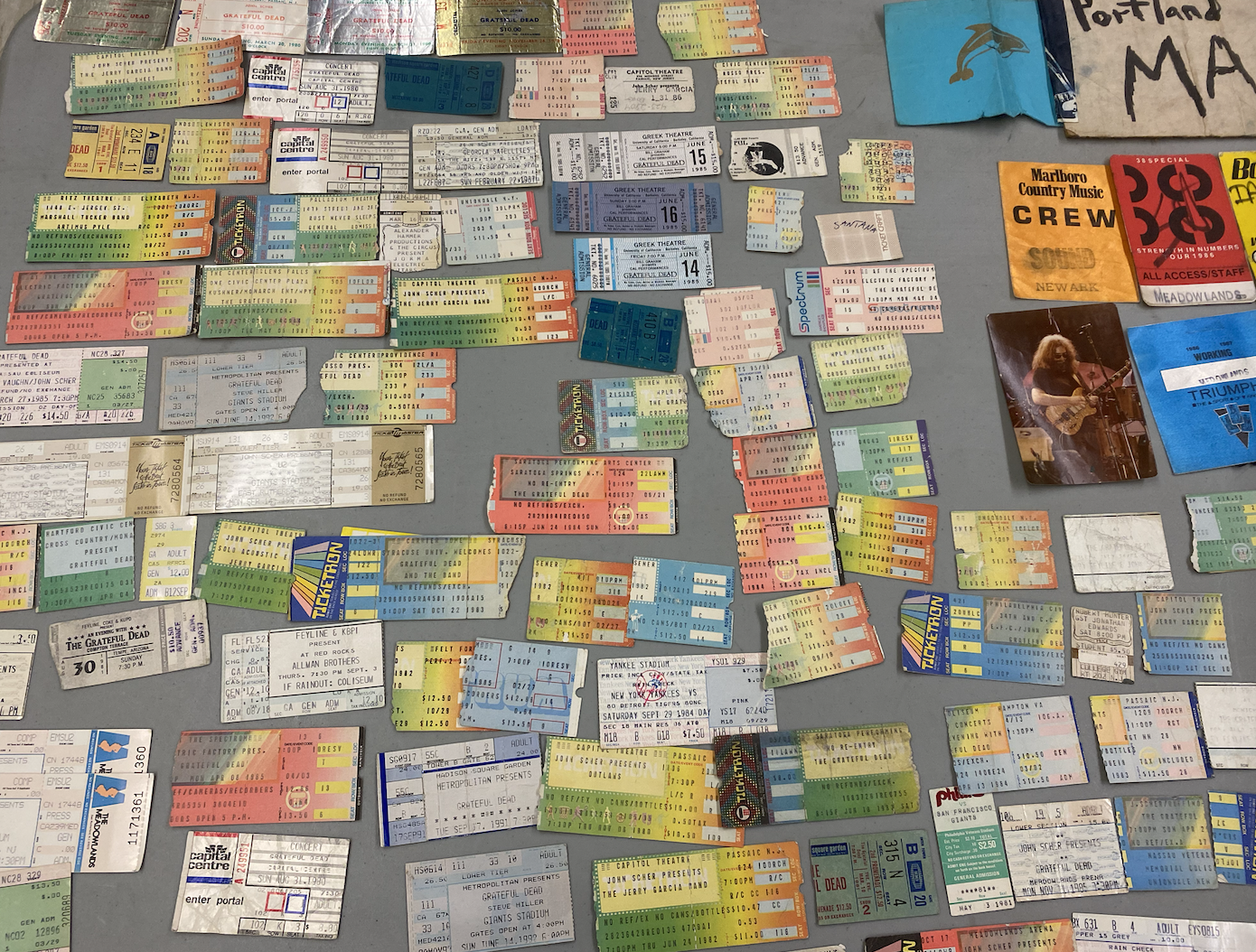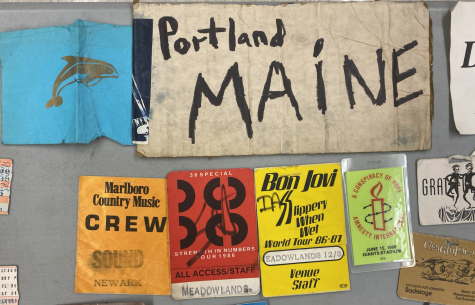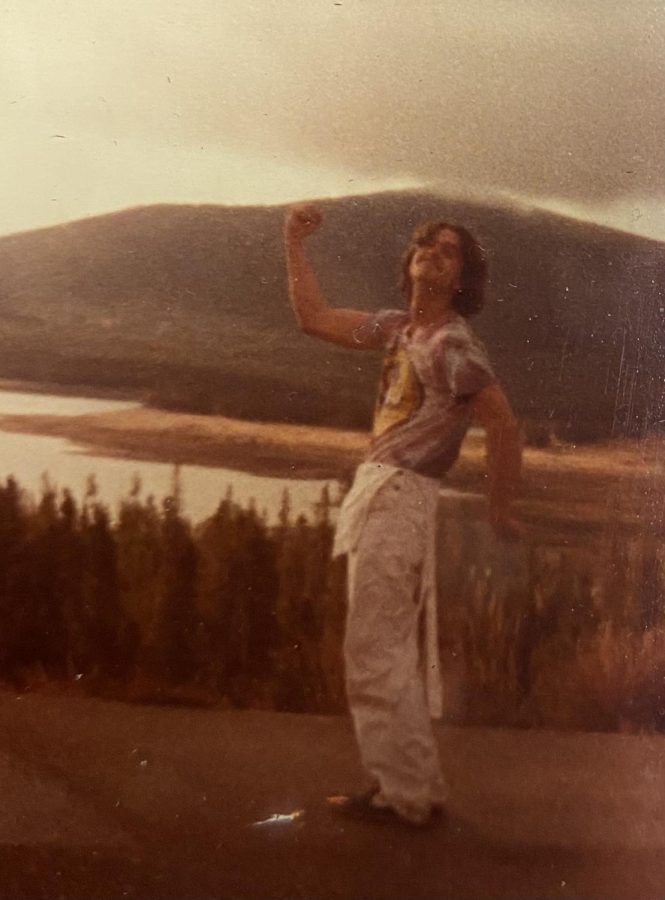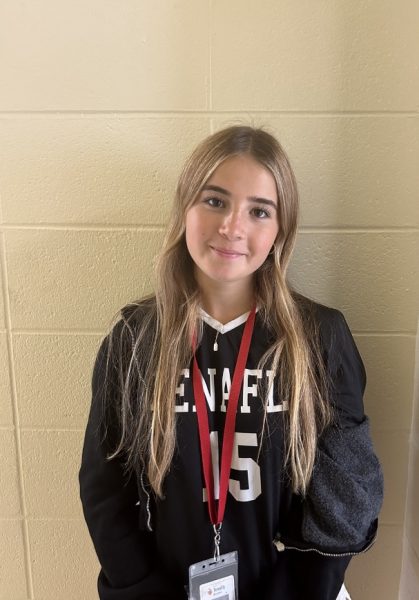“Not Fade Away”: Stephen Bogue and the Grateful Dead
January 25, 2023
It was a Wednesday morning, precisely 7:30, when I met Stephen Bogue, the head custodian at school. He had a tie-dyed Grateful Dead cap placed upon his head, and in his hand, he clutched a wooden broom that he had been swiftly sweeping across the cafeteria floor. I awaited him, rubbing my dried eyes as I fished for my laptop from within my backpack. Little did I know, the wide-eyed man had been up since 3:30, and in the building since 5:30 to open up the school doors. After stowing away his bulky equipment, Bogue approached me, and we then entered a bare room with only a table in the center. Sprawled across the table, though, were scattered ticket stubs, stacks of ripped out Grateful Dead magazine covers, and dusty photo albums.
“Where did you find all this?” I couldn’t help but blurt out.
“My attic,” he replied.

Bogue has always been well-immersed in music, and his grandfather, who was a conductor, was a figure of significant influence. “I grew up in music,” Bogue said. And while he tested the waters playing the piano and the clarinet, passion inside him stirred; he yearned for the adventure and the experiences of live music. And so, in his youth, he devised a rather rebellious plan to sneak into his first live concert, Hot Tuna at the Capitol Theater in Passaic, New Jersey. Sure enough, the fourteen year old found himself lingering backstage.
When I spoke to Bogue, specifically about the relationships he made along the journey, his eyes lit as if I had sparked a long-untouched, ancient nerve. “Amazing,” he reminisced. “I used to hunt down printouts to track where [The Grateful Dead] were going next,” he said as he pointed towards an oxidized sheet of paper with a script I could hardly decipher. “This was the East coast tour the Grateful Dead did,” he elaborated.
I peered at the sheet a bit longer. “You did all of these?” I probed.

“Mm-hmm,” he said with a prominent grin. And as he proceeded, he reminisced on the tour, on the 18 to 20 shows he had attended back-to-back, running on only a few hours of disturbed sleep. I even uncovered that he had hitchhiked all across the country to follow the band. He showed me a handmade cardboard sign he’d used when hitching to Portland, Maine for a Dead show. “About ’82,” he said, pointing to the weathered sign. Turns out, Bogue and a companion had set out hitchhiking to Chicago for a three-night concert in the uptown theater. The two carried a rather light load, not much more than sleeping bags in which the two found shelter on Route 80 in Youngstown, Ohio for the night.
“I actually hitchhiked pretty much the whole country,” he said. It took me three days to get from Tempe, Arizona to New Jersey.”
Bogue soon became interested in the technical aspects of live music, and through a friend, he caught word of a stagehand opportunity. It was an opportunity to live out his wildest teenage dreams, and he seized it almost immediately. “I began hanging out with them [the band] pretty frequently, you know. I got to know ’em from going to all their concerts, and then I sort of naturally became a stagehand,” he said. “It was like they suddenly saw me rolling out their carpets on stage, and they were like, what are you doing? I said, ‘I’m getting paid now to watch you guys.’” And for the next five years, Bogue immersed himself in the music, relishing the electrical work and the scaffolding projects. And, of course, the music.
He flipped open the front cover of a dusted album, and once again, a smile emerged. “That’s my little brother Anthony. That’s me in Colorado. That’s Frank, or Chimpo I should say. A fishing trip in Montauk with all my deadhead friends,” he went on. And as he went through the album, the stories amassed. The friend who had Jerry Garcia’s signature tattooed onto his arm. Bogue’s ponytail days. A best pal, Nicky. Finally, I asked him how often he thinks back to his days “hanging with the Dead.”
“Always,” he said.
Of course, I had one question that still lingered. “So why did you quit?”
His face turned solemn. “It wasn’t steady. I met my wife, and that was it. I was like, if I go out there now, I’m never going back.” And so, at 28, Bogue prepared for the next stage in his life: raising his children and settling down in the suburbs with his wife. “Still, I have the Grateful Dead on in the car, and my kids love it. My granddaughters dance to it,” he said.
There was a brief silence, and Bogue exhaled. “Well, that’s my life,” he said. “Boring right?”
Smiling, I responded. “Very.”
He laughed.

















































































































































